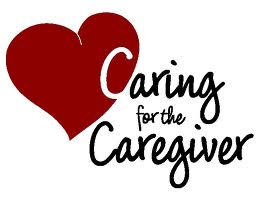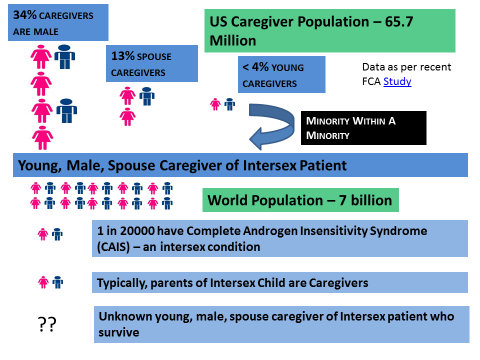 A recent survey by the Family Caregiver Alliance, there are 65.7 million family caregivers in the USA and found that 34% of all caregivers are Males.
A recent survey by the Family Caregiver Alliance, there are 65.7 million family caregivers in the USA and found that 34% of all caregivers are Males.
It also found that young caregivers comprise less than 4% of all caregivers, and less than 13% are spousal caregivers.
This survey for the first time gives us a remarkable insight into the previously hidden world of caregivers, and contrary to the well established and pervasive stereotype of the elderly female caregiver, we find within the data the existence of a rarely recognised and seldomly supported minority caregiving group, the young to middle-aged, male, spousal caregiver, a minority within a minority.
Minority Caregiver
The condition is very traumatic for the patient. What kind of support, resources, rights are available to this minority male caregiver category?
Anyone who cares for someone, regardless of their gender, has a compassionate and selfless view of the world. They deserve respect, support and laws to protect them equally regardless of gender. Consider some of the issues that a young, male, spousal caregiver may be faced with.
- The caregiver is a male – a minority. As per a recent survey, 34% of all caregivers are men.
- The caregiver is young in their 20s or 30s, far younger than the average age of 49 for a caregiver.
- Less than 13% of all caregivers are spousal caregivers. They are themselves at high risk of becoming a patient themselves.
- Young, spousal caregivers are also at imminent risk of losing the emotional support and intimacy of their spouse, depending on the patient’s medical condition.
- Spouses do not have access to information of their loved one, whose information is hidden due to privacy provision.
- Because of a lack of information or privacy, resources and support are unavailable for the young, male, spousal caregivers.
- The young, male, spousal caregiver’s life, career and future plans are at a standstill at a very young age.
- What if due to a traumatic medical condition there is domestic violence or abuse against the young, male, spousal caregiver? There is very little protection for the male carer in this situation under law.
- The young, male, spousal caregiver has to fight the entrenched stereotypes and the related bias against them, found in every institution that otherwise is there to help caregivers.
- Caregiving Isolation – there is very little support and people who understand a young, male, spouse caregiver in his peer group during caregiving. And once caregiving has ended, there is still very little support and people who understand as the caregiving has changed him forever.
There are several other socio-economic, psychological, and other issues that arise out of this one event in their life. The young, male, spousal caregivers range from being caregivers of cancer patients to several other medical conditions. In many cases, the carers relationship with his loved one, the patient, is relatively short and not yet fully developed. As per a recent study by Fred Hutchison Cancer Research Center, women are 6 times more likely to be divorced or separated when diagnosed with a major illness. The carer could have left early in the relationship, however the young, male, spousal caregiver stays in an unpaying caregiver position out of selfless love. A commendable but very rare trait in this world.
Broken Trust Of A Caregiver
Now imagine if the young, male, spouse has also been deceived as to the existing condition of his spouse. Imagine if the spouse had a rare medical condition which was hidden in the sanctity of marriage. Now the young, male, spousal caregiver becomes a miniscule minority within a minority. Androgen Insensitivity Syndrome (AIS) is a condition that affects sexual development before birth and during puberty. People with this condition are genetically male. They may have female sex characteristics or signs of both male and female sexual development. Caregivers of AIS or intersex patients are a rare but very committed group of people. Given the secrecy and deceit surrounding intersex, the young, male, spousal caregivers of an intersex patient may have been unwitting victims of a relationship based on half-truths or untruths.
Trust is paramount in a marriage and what does one do when trust is broken? Among the intersex community, there is a widespread discussion on foregoing the traditional concealment-based approach (aka deceit and secrecy). Because of this secrecy, the male, spousal caregiver does not get the information about the medical condition because of privacy prohibitions. How is he supposed to cope alone without proper access to information. Moreover, given the stigma associated with the medical condition, the caregiver has to debate between saying the truth or respecting the patient’s privacy. How is he supposed to get support or help from support groups, caregiver resources unless he is allowed to say the truth. In a way, it is like fighting the same social taboos all over again like in HIV/AIDS and the fight is still continuing.
As with other rare medical conditions, to the layman, they have possibly no information about the condition and may have never even heard of AIS or intersex before. While the condition may be traumatic for the patient, what about the caregiver who has little information about the condition, and even less support?
Caregiver of Intersex or AIS Patients
The impoperly-informed caregivers of AIS patients, itself a rare condition, are an even smaller subset of a minority, but are no less deserving of support and compassion themselves. It is hard to find any similar caregiver category, which combines the pressures of youth and caregiving, with the unfortunate elements of deceit and stigma. Does this however mean that young, male caregiver should not get support? The answer should be No, however the reality is very different. It seems like it is a crime to become a young, male caregiver due to the severe lack of awareness and support. Let us defeat the secrecy and stigma with truth and education.
What is so unique about the unwitting caregivers of AIS patients who are their partners, unlike parents or family?
- The unwitting caregiver entered a relationship based on deceit, only to later find out about the reality of their AIS partner.
- The AIS patient has plenty of support and resources, however due to privacy provisions, the caregiver is often left in the dark.
- The unwitting caregiver’s feelings and abuse are never recognised, let alone addressed.
Let us start by providing the needed support to the young, male caregiver one thing at a time.
The situation is so unique that there are no support groups, no NGOs, no medical intervention groups, no laws, no ‘institutional look the other way doers’ to help young, male, spousal caregivers of AIS and protect their rights. While the world is still struggling with equal rights for LGBTI, rights of caregiver of LGBTI are not even on the horizon yet. What about equal human rights?
When one factors in the “stereotypes” where males are considered to be LESS of a caregiver, these specific group of caregivers have an added burden of fighting through the bias and discrimination. There is no one to marshall the resources and work the system to help the caregivers who have undergone this severe trauma in loneliness at a very young age.
Imagine a different medical condition like Alzheimer’s. While there is no known cure, the best cure is to rejoice the moments there are. There is a lot of information and resources and support groups for caregivers of Alzheimer’s. The inclusive approach makes the experience so much better both for the caregivers and the patients. Isn’t truth the best way for all caregiver-patient relationships regardless of the medical condition?
This post originally appeared on Ezine4Males Articles on 11th Apr. 2012. This is cross-posted from there.





 Facebook
Facebook GooglePlus
GooglePlus RSS
RSS Twitter
Twitter